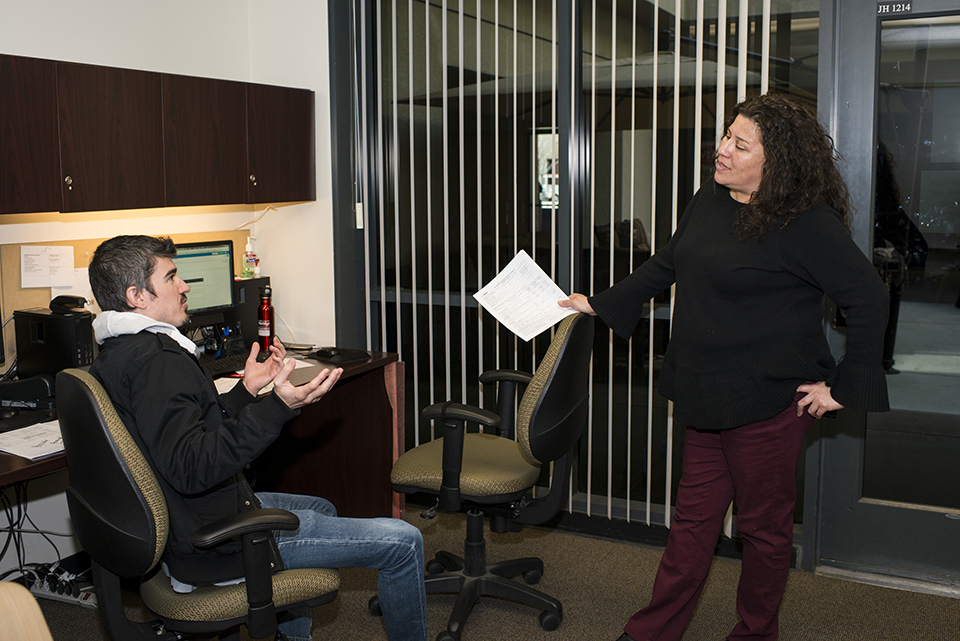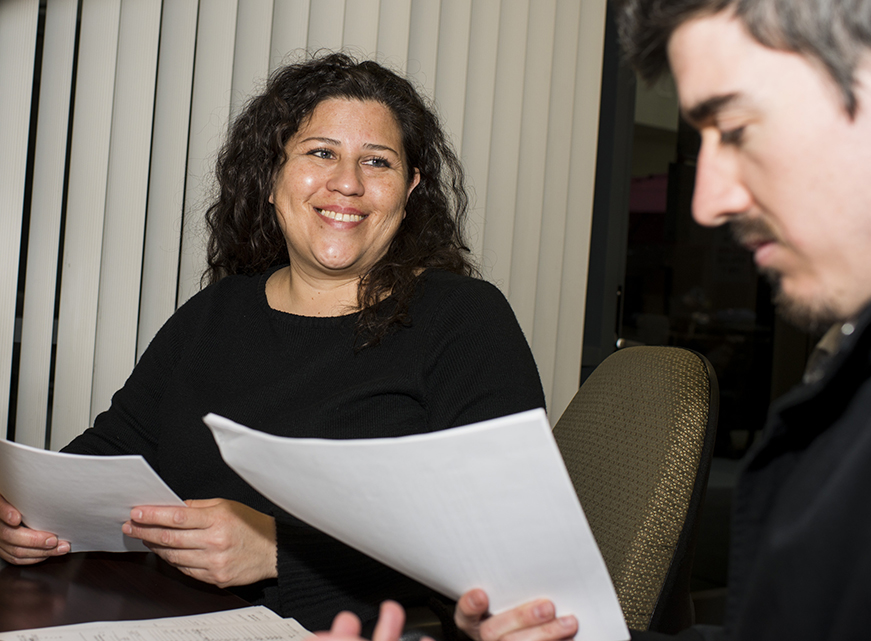CSUN’s Bookstein Low Income Taxpayer Clinic Defends Clients in IRS Disputes
The retired engineer had kept all his receipts, documenting the charitable contributions that in 2013 had eaten a chunk of his fixed income. So Thomas Buehler was surprised in July 2016 when he received a letter from the Internal Revenue Service (IRS).
He’d been audited.
The IRS was not allowing several of the deductions he’d claimed on his 2014 tax return. Including interest, he owed about $8,000.
Fortunately, the IRS provided a list of companies and organizations that help low-income individuals and families resolve tax disputes. Buehler, a Sylmar resident, was drawn to one in particular: the Bookstein Low Income Taxpayer Clinic at California State University, Northridge.
“First of all, it’s close to where I live. I am 85 years old — I don’t like to drive too much,” said Buehler (CSUN Today is using a pseudonym; citing privacy concerns, he requested his real name not be used). “I knew where CSUN is — my kids graduated from there. So I have faith in CSUN.”
His case demonstrates the skill and tenacity of the CSUN student clinicians and faculty members who staff the clinic, which helps people who can’t afford to hire accountants or attorneys to represent them in disputes with the IRS.
And the results were exceptional: CSUN convinced the IRS to drop Buehler’s case.
Total amount owed: $0.
“You can’t get better than a full concession,” said Steven L. Jager, a certified public accountant (CPA) and faculty member in the Master of Taxation program, who represented Buehler in meetings with the IRS. “It doesn’t get better than this. I’m exceedingly proud of that, but it’s not that unusual for our clinic.”
As part of the Bookstein Institute for Higher Education in Taxation, the Bookstein Low Income Taxpayer Clinic was established in 2008 in CSUN’s David Nazarian College of Business and Economics to give accounting and graduate tax students real-world experience in representing clients in tax disputes with the IRS.
Clinicians can help reduce amounts owed, negotiate repayment plans and give clients the best chance at navigating the country’s complex tax system. The clinic operates year-round and serves about 200 taxpayers per year, said Rafi Efrat, Bookstein Chair in Taxation and director of the clinic.
All clients must meet income eligibility requirements. The threshold is 250 percent of the federal poverty guidelines (for example, an income ceiling of $40,600 for a family of two in California). People needing tax assistance can make an appointment to determine if they are eligible.
LITC student clinicians interview clients to determine the nature of the dispute and goals of the case, then come up with a strategy for resolution. The students receive special permission from the U.S. Department of Justice’s Office of Professional Responsibility to represent taxpayers in discussions with the IRS, tasks normally handled only by attorneys and CPAs.
The students, who participate in the clinic as part of the Introduction to Federal Tax Procedure course, work with three faculty advisors: Jager, accountancy lecturer John Balian and assistant professor Sharyn Fisk of the Master of Taxation program.
Jager passed a special bar exam to become one of just 300 CPAs and enrolled agents (EAs) in the country who can represent taxpayers in courtrooms (clients in tax cases usually hire a lawyer to represent them, or they can represent themselves).
Buehler had tried to resolve his case through the mail, working with a reputable CPA firm to send in additional receipts to verify the charitable donations in question. Deciding he wanted new representation, Buehler visited the clinic office and worked with two students, including Eileen Gonzalez, the case manager who ensured that all his supporting documents were in order, and Samantha Saldivar ’17 (Accountancy), who assisted on the case in her final semester.
“I knew that he had a fighting chance,” Gonzalez said.
Buehler’s case never made it to trial. Jager was able to settle it in a pre-trial teleconference with the IRS known as a Branerton conference, where the IRS and the taxpayer settle on a set of facts and try to come to a mutually acceptable resolution.
Jager argued that Buehler’s record keeping was better than the government was giving him credit for. Further, a judge would not be happy to hear a case that essentially boiled down to a few missing receipts for charitable donations, Jager said.
“If he has 90 of the 100 receipts, the IRS doesn’t want to bother the court with 10 receipts that are missing — unless the organizations he donated to are doubtful,” Jager said. “These organizations were well known. He either donated or didn’t.”
The government conceded.
Buehler said he would turn to the taxpayer clinic again if he ever finds himself in another IRS dispute.
“I have nothing but good to say about them,” he said.
The case was a great learning experience, Gonzalez said.
“To be able to have success with a person that needs your help, you can’t put a price on that,” Gonzalez said. “This is better than any internship out there. We have the full support of CSUN’s faculty and professors.
“When I have my own practice and a case comes in, I can say, ‘I got this.’”
Prospective clients of the Bookstein Low Income Taxpayer Clinic who are in disputes with the IRS may submit the online Tax Clinic Screening Form or call (818) 677-3600.
For assistance in filing your taxes, please contact the CSUN VITA Clinic.



 experience
experience